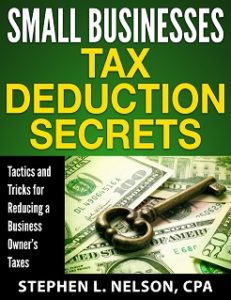
One of the biggest tax-related stresses people encounter is the situation where they accumulate several years of past due taxes and tax returns.
Often, taxpayers in this situation feel just terrible about all this. And usually they bear tons of stress.
So I thought I’d share some quick comments about this, really rather common situation… (Probably if you’re in this predicament, things are not quite as bad as you think.)
You Aren’t Going to Jail
A first comment: You don’t go to jail for not filing your tax return and for not paying your taxes.
Rather, you pay penalties, get all sorts of harsh-language correspondence from the IRS… oh, and you potentially lose out on refunds you’d otherwise be entitled to. (This last issue by the way, is often a bigger problem than people realize.)
But you don’t go to jail.
The Statute of Limitations Is Not Your Friend, Part I
Here’s the next thing to know: The statute of limitations (typically three years) doesn’t start ticking until the later of the date you either file the return or the due date of the return.
Accordingly, if you don’t ever file a tax return, the problem doesn’t go away if the return just gets old enough. You will eventually need to file the tax return.
Example: It’s been four years since you should have filed a tax return. But you still owe the tax return and the tax liability the return shows as due.
The Statute of Limitations Is Not Your Friend, Part II
But here’s something else to know about the statute of limitations: While the statute of limitations doesn’t let you skip filing a tax return or paying a tax liability due, it may goof up your ability to claim a refund related to an old, unfiled tax return.
Example: It’s been four years since you should have filed a tax return. What you didn’t realize is that you actually have a $5,000 refund for that year. Unfortunately, because the refund is more than three years late, you’re out of luck.
When the Statue of Limitations is your Friend
One time when the statute of limitations is your friend is when you did file a return but inadvertently made an error. Once the statute of limitation passes, in general, you don’t need to worry about that year.
For example, if an error was made on a return filed more than three years ago, the error in general doesn’t matter. If you actually owe the IRS $5,000, too bad for the U.S. Treasury…
By the way, the same rule applies if the Treasury actually owes you money. If the Treasury owes you $5,000 on related to a tax return for which the statute of limitations has passed, too bad for you.
Note: The statute of limitations is typically three years from the date you filed the return or the return due date—whichever is later. In a couple of special cases, though, the statute of limitations isn’t three years. For example, if a taxpayer omits more than 25% of his or her or their gross income, the statute of limitations equals six years. For another example, if a taxpayer files a false or fraudulent return, there is no limit. Yikes.
The Failure to File Penalty is Brutal But Sometimes Manageable
While you don’t need to worry about penalties related a past due tax return if you owe nothing (common) or if the IRS owes you a refund (also common), if you do owe money, you pay a penalty.
The math of the penalty gets complicated, but basically what happens is that the IRS charges you a 5% penalty for the first five months you’re late. And then the IRS also charges you interest on the taxes, any penalties, and interest you owe.
Example: You owe $10,000 and pay the taxes a year late. In this case, you’ll end up owing five $500 penalties, or $2500. In addition, you’ll probably pay interest on the $10,000, on the $2500 of penalties, and interest on this interest. In short the penalties and interest quickly compound. Sorry.
Two Tricks to Save Money on Past Due Taxes
Fortunately, you often do have a couple of things you can do to minimize penalties and interest when you’re dealing with past due taxes and returns.
Here’s a first thing you can do if you’re dealing with multiple years of past due returns: Be careful about the way you deal with any past due returns that show refunds. What you want to look for are opportunities where you can apply one year’s refund to another year’s past due tax liability. You may be able to carry forward one year’s refund to another, subsequent year’s liability and then eliminate the big 5%-per-month penalties on the subsequent year’s return.
Note: The IRS won’t apply refunds in a manner that minimizes penalties. But you get to specify the way you apply payments including refunds. So be thoughtful here. Or get the help of a local professional.
One other thing to stay alert to is the opportunity to use the first time penalty abatement process. Whether you might be able to use this “mulligan” for a particular penalty depends on the specifics of your situation. But you want to check on this.
Here’s a link to the page in the Internal Revenue Manual that describes how IRS employees are supposed to deal with taxpayer penalties: http://www.irs.gov/irm/part20/irm_20-001-001r-cont01.html
You want to scroll down to the paragraph labeled, “20.1.1.3.6.1 (08-05-2014) First Time Abate (FTA).”
Do You Have a Past Due Taxes or Past Due Returns Problem?
 If you’re a small business owner and in the situation where you’ve got past due taxes or past due tax returns, you really need to make sure you capture all of the legitimate business tax deductions you’re entitled to. This process should minimize income taxes, self-employment taxes, penalties, and then of course interest.
If you’re a small business owner and in the situation where you’ve got past due taxes or past due tax returns, you really need to make sure you capture all of the legitimate business tax deductions you’re entitled to. This process should minimize income taxes, self-employment taxes, penalties, and then of course interest.
Accordingly, let me mention a modestly-priced resource we provide which could save you thousands in taxes, penalties and interest.
We’ve written and published an instantly downloadable 70pp e-book, Small Businesses Tax Deduction Secrets, that provides detailed instructions about how you can annually save thousands in income and related taxes simply by structuring activities to protect legitimate deductions, to create new deductions and to recycle (or double-deduct) the deductions.
If you’re interested in this resource–the e-book costs $40–click here for more information.
Tip: If you are a client of our CPA firm, don’t purchase this e-book–or any of our other e-books. Just email us and ask for your complimentary copy or copies. Also, if you’re in the process of becoming a client? Don’t buy the e-book or e-books yet. Rather, wait until we’re working together. We’ll then provide you with your complimentary copy or copies…
Instantly Downloadable & Money Back Guarantee
The book is instantly downloadable. You get the e-book when you purchase it. (We also send you an email after your purchase with a link you can also use to download the e-book pdf.)
By the way, we provide a money-back guarantee. If you don’t information you need or want, no problem. Just email us and request your refund.
And to the tax professionals, always get good size retainers on these engagements.
Your new client may not like the results of your findings and could easily disappear on you after you’ve invested a good amount of time on their work.
In most cases someone not overly concerned about paying the IRS is certainly not going to worry about paying accounting and tax fees promptly.
Several times I’ve had initial meetings with these type of taxpayers never to be heard from again once i requested a retainer in advance.